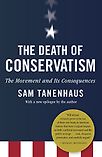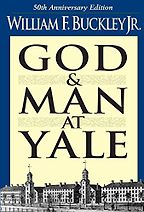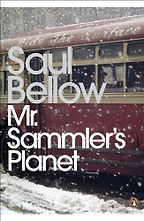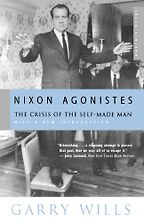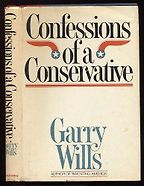Let’s start with God and Man at Yale. This is obviously a seminal book, but why is it on your list?
What is important about God and Man at Yale is that, although it’s not the best argued or even the most serious of modern conservative books, it changed the argument. It made the conservative argument about culture. What Buckley is saying is that if you want to identify your adversary, he’s in the ivory tower of the Ivy League, and not only there, but in the most conservative of the Ivy League universities.
Buckley himself was not only a recent alumnus of Yale, but the big man on campus, the most celebrated undergraduate of his moment. He edited the campus newspaper, he had written editorials that were widely read at other universities and even filtered out into the broader population. That somebody who came from inside of that establishment should identify that establishment as the enemy changed the way conservatives looked at their arguments. It would no longer be just about economics, or just about monetary policy, or about economic individualism (though Buckley comments on all of that) – it would be about the class, the ruling class as he saw it, the academics at this prestigious university.
This is where you begin to see the anti-élitist strand. Would it be too much of a stretch to see the roots of Palinism here?
Not at all. God and Man at Yale was published in 1951, at precisely the moment that Joe McCarthy was emerging as the first truly populist figure on the right. What Buckley did was to provide a high-minded analytical text to accompany McCarthy’s allegations that there was a kind of treason going on within the upper ranks of the American establishment. So when McCarthy is denouncing Dean Acheson, Alger Hiss, Owen Lattimore and all these members of the foreign policy establishment, Buckley shows you all these economics professors, religious professors and political scientists at Yale, who are indoctrinating their innocent students with New Deal propaganda. In a way, what he did was to give you a more educated, erudite version of McCarthy’s attack on the culture.
Buckley is himself the élite. Is there a tension there, and does that persist in the movement?
There is a tension, though Buckley’s background is more complicated than people often realise. He grew up on a very large and well-appointed estate in the Berkshires, in Sharon Connecticut. But his father was an oil wildcatter from Southern Texas, who tried to make his career in Mexico as a lawyer and oilman, before he was driven out by the Revolution in 1917-21. Buckley’s mother was from New Orleans. So Buckley actually comes out of the political tradition of the Deep South, Dixie, and that’s why for a long time you saw some of those complicated and misguided racial arguments in the National Review.
It also reflected a kind of Creole culture that Buckley came out of – where blacks and whites would mingle, but in their separate strata, where you’d grow up in a house full of servants, some of them Spanish-speaking. In a sense, it was a complicated microcosm of a society, only very rigid in its social stratification – and that’s how Buckley looked at the world. At the same time his father was constantly fighting battles on Wall Street. That’s why he moved to Connecticut: to get Wall Street backing for his new ventures against the big oil companies. So William F Buckley senior would regale his family with stories of how he outwitted the big shots at Standard Oil. That’s one reason Buckley and Rockefeller were at sword points for many years. In a way there was an odd distrust of the East Coast and Wall Street in the Buckley background, even as he seemed to be a product of the East Coast élite.
I’m seeing echoes of Mitt Romney, the tribune of the common man who happens to be worth $500 million.
That’s a good comparison. What figures like that always struggle with is not only the apparent contradiction, their not being very good at pretending to be the common man, but also many of their tastes and values are not to the mass popular taste. Buckley has an uncompleted manuscript called The Revolt Against the Masses, taking on the arguments of Ortega, about the dangers of mass man – at the same time that he and his colleagues discovered the value of a figure like McCarthy. And that’s one reason why they put up with McCarthy. They saw McCarthy as having political utility, even if they didn’t like him very much.
Some people would say the same about Palin.
Very much so.
A major theme I took away from your own book, The Death of Converatism, is that in order to understand conservatism you need to see it as sociology no less than ideology. It’s about culture and who you identify with, no less than what it is you happen to believe. Your next three choices all date from a similar period, 1970, 1971, and they’re all, arguably, more cultural artifacts than political – though maybe Nixon Agonistes is different. Tell me about the Bellow and the Updike first – why are they on your list?
I do think in America in particular politics, sociology and culture are inextricable. The party we belong to, the candidates we support, the ideas we espouse in the political realm, overlap with our cultural tastes and our perception of where we fit in – or where we don’t fit in – among the other members of this huge society.
Bellow’s novel Mr Sammler’s Planet made an enormous impression on me when I read it at the age of 18 or 19 when I was in college. It was the first time I had seen this great writer – probably the greatest of all modern American novelists – actually critique liberal assumptions. I had grown up in a liberal household, but my father, who was a political scientist, was very uneasy about the uprisings in the late 1960s on campuses, the disdain for liberal professors and liberal ideas.
Mr Sammler’s Planet is really the first and only great classic of neoconservatism. Bellow’s character, Arthur Sammler, is a Polish Jewish émigré who survived World War II, raised on the great British liberalism of the early 20th century. His heroes are figures like H G Wells, a very pragmatic, quite utopian socialist. And Sammler, living in New York, sees and describes – and Bellow with his extraordinarily vivid tactile prose really brings it to life – the actual physical, sexual and moral decay of Manhattan. There is a kind of licentiousness in sexual relations, there is disdain for older, inherited values.
“Mr Sammler’s Planet is really the first and only great classic of neoconservatism”
Sammler, in an episode based on Bellow’s own experience, gives a lecture at Columbia where he is denounced and hooted out by undergraduates who don’t have a fraction of his learning, or respect for ideas and intellect. Liberalism itself is coming under assault. So what Bellow – through Sammler – does is to ask whether liberalism itself is somehow complicit in its own dissolution.
And when I read this as a college student, just vaguely aware of these things going on around me, it was just a revelation. The power of the prose, the precision of the argument – it’s not one of Bellow’s very best books, but if you read it at the right moment it’s shockingly powerful. The critic Alfred Kazin, a contemporary and friend of Bellow’s, said Mr Sammler’s Planet is not a novel, it’s an austere set of opinions, but those opinions are very brilliantly and philosophically expressed.
It presages the break of the neocons over culture, that Tom Wolfe essay, ‘Radical Chic’, on the famous Leonard Bernstein party.
I happen to believe that the peak period of conservatism as an intellectual force in American life came in the years 1967 to 1973. That’s when figures who were not identified in any way with conservative ideology or politics began making arguments that sounded classically conservative.
Another example is Updike’s great novel Rabbit Redux, published in 1971. It’s the second in his Rabbit tetralogy, and generally the least admired today. The books themselves constitute a great classic in American literature, maybe the greatest of our period. Rabbit Redux is set in 1969 and it involves racial conflict, drugs, the dissolution of the family, and reactions and struggles over the war in Vietnam. Updike himself supported the war in Vietnam, and found himself almost isolated as a figure because of that support. And the reason he supported it is one that sounds very like the reason neoconservatives today supported the war in Iraq – it’s because Updike was offended by the liberals who denounced it.
He didn’t necessarily believe there was much to be won in Vietnam – what shocked him was that Lyndon Johnson, the heir to the New Deal (and Updike was very much a New Dealer), should be accused of murder by American citizens in a very taunting, aggressive and dehumanising way. It was shocking to him.
He describes this in his memoir, Self-Consciousness. The anti-Americanism of the American left appalled Updike. So, going back to his own world, his lower middle-class roots in Pennsylvania, what he does is make Rabbit Angstrom the precursor of the Reagan Democrat. Rabbit Angstrom is a lifelong Democrat, who voted for Hubert Humphrey in 1968, and is angered by the racial unrest, by African-Americans who seem to want government handouts. He is angered by students who come from much wealthier homes and circumstances, who have opportunities that Rabbit Angstrom has never had, who seem to hate America. Updike captures those passions with great immediacy. So that book made a huge impression on me.
But it’s not a polemical book – Rabbit is not himself immune or outside of these forces…
No, not at all. The genius of Updike is that he throws himself and his characters into the middle of the controversies of the day. So Rabbit himself smokes pot and has sex with an 18-year-old runaway who comes from a wealthy family in Connecticut. He lets a black militant live in his house.
He’s drawn to all the forces that he is appalled by. And that’s the genius of fiction – instead of lecturing us about all of this, Updike tries to bring it to life from many perspectives, and make it feel very concrete.
In hindsight, were Updike and Bellow signals that liberals should have heard but missed?
Not only did they miss them, they repudiated them. Both Updike and Bellow were very admired literary figures, but they were, to a certain extent, exiled from the most trendy and chic precincts of American culture. Bellow spent very little time in New York; Updike had already left New York in the 1950s. Updike has a line in his memoir, Self-Consciousness, where he says, ‘I don’t like New York audiences, they’re too smart and left-wing for me.’ He’s talking about the most brilliant people of his time.
They were not only unheeded, but they were scorned for much of this. These are two of the greatest fiction writers in all of American literature and neither one of them is taught much on campus curricula, even to this day. I gave a talk at Yale a couple of years ago, and I knew that there would be people in the audience who would blog or comment about what they assumed my politics were, and how The Times Book Review has become neoconservative and all this silliness. I said, ‘Here is the most controversial thing I have to say: to me it is a disgrace that the fiction of John Updike and Saul Bellow is not taught to college students on this campus.’
But neither is really embraced by conservatives either…
That’s true. Updike was a lifelong Democrat, and Bellow was very ill at ease with the strong neoconservative agenda. He agreed with parts of it. I think they like Bellow better than they do Updike. Also they write very openly about sex – Updike in particular. They do not belong to ideological camps.
These are really the people who the current culture war is battling over, the allegiances of this group.
I think that’s right.
You’ve got a third book from this period – talk about being an exile – by Garry Wills. Nixon Agonistes is obviously a landmark – why is it a landmark for you, though?
Wills was the writer who made me want to write about politics. It’s so creative and imaginative, just in the prose, that it has the power of the novel. At the same time, Wills asks these enormous questions. He’s really looking at the market, and our idea of liberty, and what it really means.
It’s interesting because Wills wrote this book in a period of transition, he was moving from the right to the left. Wills was the most prized protégé of Bill Buckley and James Burnham. They thought he was the next genius, that he would lead conservatism into the promised land. In fact he had never been comfortable with some of the ideology. Wills was kind of a communitarian; he didn’t like Randian economics, for instance, or the Randian world view, or even any kind of economic individualism. He was always very suspicious of it, partly because he’s very religious, but also because Wills was in tune to all the subtle changes in the culture, just as Bellow and Updike were.
The civil rights movement made a tremendous impression on him, as did the war in Vietnam. So he began to rethink his own first principles; why was he following Nixon around? He gives you the best, most vivid picture of Nixon you will ever read – Nixon physically, Nixon’s speech, Nixon’s ideas, Nixon’s background. Wills came from the right, so he understood that much of the protest of this period, in 1968, was coming from the right. He has a brilliant setpiece on George Wallace. Everyone else of this period was looking only at the new left, at the student radicals, the Black Panthers. Wills thought there was as much energy and danger coming from the far right as there was from the far left. So it gave a scope to that book that you won’t find anywhere else. I read this book every year.
Yes, for all the talk of the revolutionary movement on the left in the 1960s you had at least as strong and a much longer lasting one on the right, and very relevant to this day.
Rick Perlstein has gotten that pretty well. He saw that the Goldwater campaign of 1964 was a tremendous moment politically. What we sometimes forget is that it carries over into the 70s. Within the movement, Reagan’s campaign of 76 was really a high point – that was almost more important than his victory in 1980. It was in essence a kind of third party campaign which conservatives of the moment – Pat Buchanan, Kevin Phillips, Bill Rusher – were all calling for. They wanted Reagan to run as a third party candidate.
There’s this romantic notion of a kind of insurgent, revolutionary movement that’s going to change everything.
Modern conservatism has almost always been an insurgency within the Republican party. It goes back to Taft, the several campaigns he ran, and the election of 1952, which was bitter. That nomination fight was as bitter as any in modern American history. The National Review was founded with the idea of chasing the Eisenhower moderates out of the Republican party, and even possibly forming a third party instead.
What happens when you get an insurgency without the ideas or the intellectual energy behind it?
Then you get a kind of anarchy in my view, which is what we see now. At least in those days you had very serious-minded people like Wilmore Kendall, who was really Wills’s mentor as he was also Buckley’s, James Burnham, Whittaker Chambers himself, though he died in 61. Then, later, there was Buckley who understood the requirements of a civil society, that governance is actually a very conservative idea, because it keeps the anarchic impulses from running rampant. All these ideals that are being lost now…
Garry Wills himself remains a conservative through all of this in a deeper sense, which brings us to your last book, Confessions of a Conservative. He’s not breaking with the conservative movement, it’s breaking with him, is that the message here?
This book was published in 1979. It’s a very small, slender book and I recommend it to people all the time because it’s so easy to read. It’s broken into two parts. The first is a series of very winning profiles of Buckley, of Kendall, and of Frank Meyer – another intellectual ideologue on the right. Then, in the second half of the book, he makes a series of arguments about conservatism.
Get the weekly Five Books newsletter
When I first read it, it was the portraits that interested me most – because I’m a biographer and his accounts of Kendall and Buckley are brilliant and rich. But now it’s the second part of the book that interests me, because there what he does is make a defence of government, and of politicians. He explains, for instance, that politicians are, by nature, supposed to be compromisers. The best politician is not the leader of a movement, but the statesman who finds the middle way between competing and conflicting ideas, the Burkean notion of government.
He also explains how regulatory agencies, which are routinely mocked by the right, actually create the confidence that most of us have in the markets. For instance, if you don’t have an FDA, people wouldn’t feel there’s a kind of imprimatur placed on the food or the drugs that they buy. That if there wasn’t a motor vehicle safety department, then you’d be a little nervous about buying a car… And business knows this too. So much of the anti-government rhetoric that we have is simply that, rhetoric.
Five Books aims to keep its book recommendations and interviews up to date. If you are the interviewee and would like to update your choice of books (or even just what you say about them) please email us at [email protected]
Five Books interviews are expensive to produce. If you've enjoyed this interview, please support us by donating a small amount.

